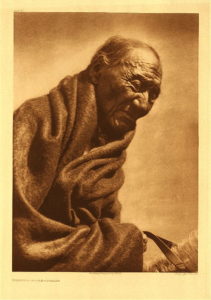Good morning.
Tuesday in Whitewater will be cloudy with a high of twenty-seven. Sunrise is 6:44 AM and sunset 5:32 PM, for 10h 47m 15s of daytime. The moon is full with 100% of its visible disk illuminated.
Today is the eight hundred thirty-second day.
The Whitewater Common Council meets at 6:30 PM.
On this day in 1868, photographer Edward S. Curtis is born:
Edward Sheriff Curtis was born near Whitewater. As a young boy, he taught himself photography. His family eventually moved to the Puget Sound area of Washington state. He settled in Seattle and opened a photography studio in 1897. A chance meeting on Mount Rainier resulted in Curtis being appointed official photographer on railroad magnate E.H. Harriman’s expedition to Alaska. Curtis also accompanied George Bird Grinnell, editor of Field and Stream magazine, to Montana in 1900 to observe the Blackfoot Sun Dance. After this, Curtis strove to comprehensively document American Indians through photography, a project that continued for over 30 years. Working primarily with 6 x 8-inch reflex camera, he created over 40,000 sepia-toned images. His work attracted national attention, most notably from Theodore Roosevelt and J. Pierpont Morgan, whose family contributed generously to his project. His monumental work, The North American Indian, was eventually printed in 20 volumes with associated portfolios. Curtis’ work included portraits, scenes of daily life, ceremonies, architecture and artifacts, and landscapes. His photographs have recently been put online by the Library of Congress.
(Morning Eagle – Piegan. 1910. Original caption: “At an age of more than ninety, Apinakuipita is still hale enough to ride his horse to the tribal gatherings.“)
Recommended for reading in full:
Charlie Savage and Robert Pear report 16 States Sue to Stop Trump’s Use of Emergency Powers to Build Border Wall:
The lawsuit is part of a constitutional confrontation that Mr. Trump set off on Friday when he declared that he would spend billions of dollars more on border barriers than Congress had granted him. The clash raises questions over congressional control of spending, the scope of emergency powers granted to the president, and how far the courts are willing to go to settle such a dispute.
The suit, filed in Federal District Court in San Francisco, argues that the president does not have the power to divert funds for constructing a wall along the Mexican border because it is Congress that controls spending.
Xavier Becerra, the attorney general of California, said in an interview that the president himself had undercut his argument that there was an emergency on the border.
“Probably the best evidence is the president’s own words,” he said, referring to Mr. Trump’s speech on Feb. 15 announcing his plan: “I didn’t need to do this, but I’d rather do it much faster.”
The lawsuit, California et al. v. Trump et al., says that the plaintiff states are going to court to protect their residents, natural resources and economic interests.




Tony Evers is throwing an interesting power move at the R-Team lege with his pot decriminalization proposal in the proposed state budget. Evers has found a way to perhaps nullify the Gerrymander at the ballot box. He is setting this up beautifully.
We saw a toe being dipped into the water in the last general election, where pot legalization advisory referendums, in various forms, were on 16 different ballots all over the state. These referendums were in liberal, conservative, big and small population areas, and cities and counties. They all won, by huge margins. Most referendums passed by a 3:1 cushion.
Now, Evers is putting decriminalization on the table and daring the R-team to oppose it. They will, of course. Reversing 90 years of demagoging reefer madness is hard to do. Vos has seemed open to minor reforms, but Fitzgerald is dead-set against it. I’ll be astounded if Evers proposal makes it into law, intact. It’s possible that Evers is setting up some sort of line-item veto ju-jitsu, but I think he is actually being much more up-front.
You can bet that a statewide pot legalization advisory referendum will be on the 2020 ballot. Evers has already hinted at that, if his budget ploy fails. There will be lots of publicity about the referendum, and the R-team will be stuck defending, to the death, a concept that ¾ of the citizens of the state, including the most conservative strongholds, oppose. The Gerrymandering process depends on the political status remaining quo. Pot legalization is disruptive, and developing a significant momentum, both locally and nationally. Getting (or remaining) on the wrong side of an issue whose time appears to have come is a terrific way to ensure you have more time to spend with your family, if you are a conservative leggie.
Adding to the pressure is the very strong likelihood of full recreational legalization happening in both MN and IL, in the next year. That will put Wisco-World conservatives in the position of watching all those pot tax dollars being spent by WI pot-smokers in states just a short “field-trip” away.
Indeed. Here’s something that’s good politics and good policy. I don’t smoke (anything), but medical marijuana at least, and regulating marijuana like wine generally, properly recognize adult decision-making and accountability.
It’s also great politics, as you note. For 2020, mix a good candidate, a possible 2020 Democratic convention in Milwaukee, and a ballot advisory referendum that’s sure to be popular, and Democrats in Wisconsin will be well-positioned for the fall.
(A successful April 2020 Wisconsin Supreme Court race, with the majority in the balance, would inspire blue voters in 2020 the way Rebecca Dallet’s win in 2018 did.)
Evers is an understated man, but he’s quietly lining up these issues well, and his team (despite a few missteps in January) shows a good grasp of where a majority of Wisconsin voters would like to go on about a half-dozen key issues.
All to the good, this proposal. Encouraging.